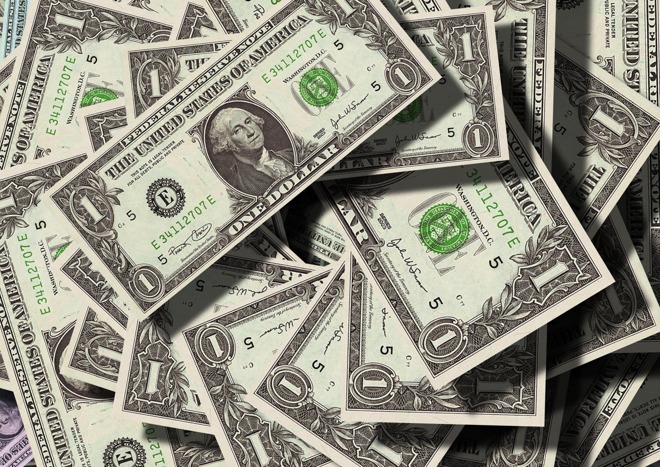Apple's $62.9 billion stock buyback program called a bad investment in new report
A new report is calling Apple's stock buyback program, which amounted to $62.9 billion in the first half of 2018, a bad investment, while ignoring the actual impact of what happens when a company retires shares.
 Pile of US currency
Pile of US currency
A new report by the Wall Street Journal highlights the money that companies have spent on stock buyback programs after a tax break by the federal government, and uses Apple as an example. Noting that the $62.9 billion that Apple spent repurchasing its own shares is now "worth" just $54 billion had the stock been retained, the publication claims that the figure represents a loss of $9 billion had they purchased the shares at today's market price of $151.
The report spends very little time noting that those repurchased shares were retired, however, and no longer have any direct monetary value. The retirement boosts the earnings per share metric that the company must report every quarter.
Apple has repurchased shares across all of 2018, paying as high as $222 a share. Any company that spends that amount of funds on rebuying their own stock will occasionally have time in the red. Repurchasing has other benefits to the company, such as reducing the number outstanding shares and buoying the dividend value per share paid to investors.
Many U.S. companies including Apple have been buying back stocks at a fever pace this year after the passage of the Tax Cuts and Jobs Act in December 2017 which dropped the corporate tax rate from 35 percent to 21 percent, also allowing Apple and most of the rest of the Fortune 500 companies in the U.S. to repatriate large sums of offshore cash.
 Pile of US currency
Pile of US currencyA new report by the Wall Street Journal highlights the money that companies have spent on stock buyback programs after a tax break by the federal government, and uses Apple as an example. Noting that the $62.9 billion that Apple spent repurchasing its own shares is now "worth" just $54 billion had the stock been retained, the publication claims that the figure represents a loss of $9 billion had they purchased the shares at today's market price of $151.
The report spends very little time noting that those repurchased shares were retired, however, and no longer have any direct monetary value. The retirement boosts the earnings per share metric that the company must report every quarter.
Apple has repurchased shares across all of 2018, paying as high as $222 a share. Any company that spends that amount of funds on rebuying their own stock will occasionally have time in the red. Repurchasing has other benefits to the company, such as reducing the number outstanding shares and buoying the dividend value per share paid to investors.
Many U.S. companies including Apple have been buying back stocks at a fever pace this year after the passage of the Tax Cuts and Jobs Act in December 2017 which dropped the corporate tax rate from 35 percent to 21 percent, also allowing Apple and most of the rest of the Fortune 500 companies in the U.S. to repatriate large sums of offshore cash.

Comments
/s
If you do the math and figure in all the impacts, paying a special dividend would be a better use if the intent was to return money to shareholders.
http://fortune.com/2016/02/02/apple-stock-buyback/
If the market believes the company (and all other things being equal), then more people want to buy shares, and the share value goes up. If the market doesn't believe the company, or if other things (like for example, an idiot president) happen, then the share value may go down.
Analysts saying it's a bad investment are day trading idiots who think that because they have the privilege of hindsight, they are somehow geniuses. Given Apple's P/E it was a fine investment, that has been undercut in the short term by political events.
We were promised increased investment, not stock buybacks for Apple shareholders. That didn't happen.
It it would also reduce the amount paid out in dividends.
What they didnt factor in was the share price collapse. So shareholder value hasn’t exactly worked out well for those who hung onto their shares after they peaked at $227. A multitude of mistakes on Apples part and a series of timed articles to pull the stock down.
People on these forums say the analysts and WSJ don’t get it , and the stock is manipulated. Etc etc. The truth however is that they do get it.. the world isn’t fair and that the word of the media and analysts do indeed manipulate the stock, but that’s just normal and they leverage it to make money. No surprise there. Expect to be played if investing in stock. If you make money, chances are it’s only because some other heavy weight players are.
AAPL treated me quite well.
Nothing will drive this stock back up until Apple has fully developed their Studio ventures ala Netflix and the market realizes the Smartphone isn't waning, but taking longer to replace year over several years, instead of year over year.
This means the services [cloud in particular] needs to become far more capable for business ends, and consumer ends to a lesser extent.
Developing a full-fledged Streaming collection like Netflix will happen. Expanding more into the Smart Home will like bloom with joint relationships.
The Auto venture is the big guess right now. If they develop a car they are better off buying a company like Lucid Motors and a Canadian firm Electra Meccanica.
https://lucidmotors.com